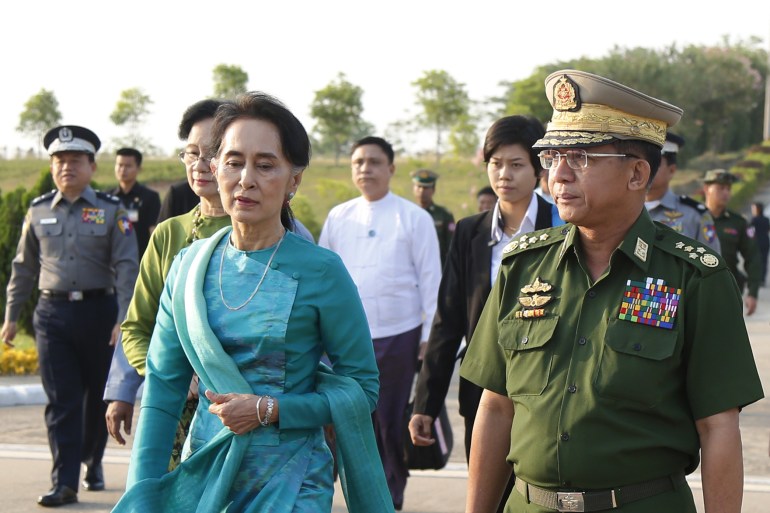United Nations leads world condemnation of coup in Myanmar
Growing calls for Myanmar military to relinquish power as the UN Security Council plans to hold a closed meeting.

The United Nations has called for the release of detainees and the restoration of democracy in Myanmar after the military seized power, leading a wave of international condemnation of the coup d’etat.
Myanmar’s military seized power on Monday, detaining the democratically elected leader Aung San Suu Kyi along with other senior members of the governing National League for Democracy (NLD), which won a landslide victory in November elections.
Keep reading
list of 4 itemsMyanmar coup: What we know so far, in 500 words
Panic, anger and uncertainty in Yangon after Myanmar coup
Timeline: Aung San Suu Kyi, political prisoner to leader
UN Secretary-General Antonio Guterres condemned the detention of Aung San Suu Kyi, President Win Myint and other political leaders and expressed “grave concern” at the transfer of powers to the military.
“These developments represent a serious blow to democratic reforms in Myanmar,” a statement from Guterres’s spokesman, Stephane Dujarric, read. The UN Security Council will meet to discuss the latest developments in Myanmar on Tuesday.
The November elections provided a strong mandate to Aung San Suu Kyi’s National League for Democracy (NLD) party, the statement added.
“The Secretary-General urges the military leadership to respect the will of the people of Myanmar and adhere to democratic norms, with any differences to be resolved through peaceful dialogue.”
The UN fears the coup will worsen the plight of some 600,000 Rohingya Muslims in the country, a Dujarric said on Monday. A 2017 military crackdown in Myanmar’s Rakhine State sent more than 700,000 Rohingya Muslims fleeing into Bangladesh, where they are still stranded in refugee camps. The UN and Western states accused the Myanmar military of ethnic cleansing, which it denied.

“There are about 600,000 Rohingya those that remain in Rakhine State, including 120,000 people who are effectively confined to camps, they cannot move freely and have extremely limited access to basic health and education services,” Dujarric told reporters.
“So, our fear is that the events may make the situation worse for them,” he said.
The 15-member UN Security Council plans to discuss Myanmar in a closed meeting on Tuesday, diplomats said.
“We want to address the long-term threats to peace and security, of course, working closely with Myanmar’s Asia and ASEAN neighbour,” the United Kingdom’s UN Ambassador Barbara Woodward, president of the council for February, told reporters.
China, backed by Russia, shielded Myanmar from any significant council action after the 2017 military crackdown. Beijing and Moscow have council veto powers along with France, the UK and the United States.
The UN called for the release of all those detained, Dujarric said. He said Guterres’s special envoy on Myanmar, Christine Schraner Burgener, “remains actively engaged” and is likely to brief the Security Council.
China, which wields considerable influence on neighbouring Myanmar, called on all sides to respect the constitution on Monday and uphold stability in a statement which “noted” events in the country rather than expressly condemning them.
State of emergency
The Myanmar army said it had detained Aung San Suu Kyi and others in response to “election fraud” in the polls, handing power to military chief Min Aung Hlaing and imposing a state of emergency for one year.
The coup took place hours before the first session of the country’s new parliament was set to convene following November’s elections in which the NLD made sweeping gains, winning more than 80 percent of the vote – increasing its support from 2015.
Summarising a meeting of the new military government, the army said military chief General Min Aung Hlaing had pledged to practise a “genuine discipline-flourishing multiparty democratic system”.
He promised a free and fair election and a handover of power to the winning party, it said, without giving a timeframe.
Later on Monday, the military removed 24 ministers and named 11 replacements to oversee portfolios,such as finance, defence, foreign affairs and interior.
Thomas Andrews, UN special rapporteur on Myanmar, told Al Jazeera that it is important for the international community to condemn the military coup in “the strongest possible terms”.
“This is an outrageous, unacceptable action by the military … The military had very little accountability as it was. What’s amazing is that they are overturning a constitution that they wrote, that gives them enormous power and a lack of accountability. So now it’s complete, free reign,” Andrews said.
“Everybody is in danger and everybody needs a strong, international response.”
Biden threatens sanctions
Bangladesh, which is sheltering approximately a million Rohingya refugees who fled violence in Myanmar, called for “peace and stability” and said it hoped a process to repatriate the refugees could move forward.
Meanwhile, US President Joe Biden threatened to reimpose sanctions on Myanmar.
Biden said the actions of the military seizing power “are a direct assault on the country’s transition to democracy and the rule of law”, adding that his administration would immediately review the 2016 decision to lift the economic penalties amid hopes then of a peaceful transition to a democratic government.
“The United States removed sanctions on Burma over the past decade based on progress toward democracy,” Biden said in a statement using the US government’s name for Myanmar.
“The reversal of that progress will necessitate an immediate review of our sanction laws and authorities, followed by appropriate action.”